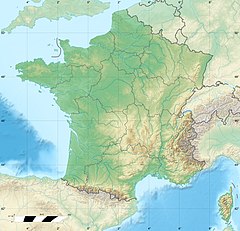| Juine | |
|---|---|
 The Juine in Lendreville (Ormoy-la-Rivière) | |
 | |
| Location | |
| Country | France |
| Physical characteristics | |
| Source | |
| • location | Forest of Chambaudoin |
| • coordinates | 48°15′46″N 2°04′12″E / 48.26278°N 2.07000°E |
| • elevation | 110 m (360 ft) |
| Mouth | |
• location | Essonne |
• coordinates | 48°32′12″N 2°22′20″E / 48.53667°N 2.37222°E |
• elevation | 46 m (151 ft) |
| Length | 53 km (33 mi) |
| Basin features | |
| Progression | Essonne→ Seine→ English Channel |
The Juine (French pronunciation: [ʒɥin]) is a French river, 53 kilometres (33 mi) long. It is a left tributary of the river Essonne.[1]
Its source is in Loiret, in the forest of Chambaudoin, less than 3 km south-west from Autruy-sur-Juine. Its name originates in the hamlet of Juines which she runs alongside before re-entering the Essonne department, in which it runs through several communes: Méréville, Saint-Cyr-la-Rivière, Ormoy-la-Rivière, Étampes, Étréchy, Chamarande, Janville-sur-Juine, Bouray-sur-Juine, Lardy.
It also runs through the parks of several châteaux (Saint-Vrain, Chamarande, and Mesnil-Voisin) and once served several now-abandoned mills. From the 15th to the 18th century, it combined with the Essonne and Seine rivers to form a navigable waterway for flat-bottomed boats carrying wheat from Beauce towards Paris. It joins the river Essonne between Itteville and Vert-le-Petit, near Ballancourt-sur-Essonne.

